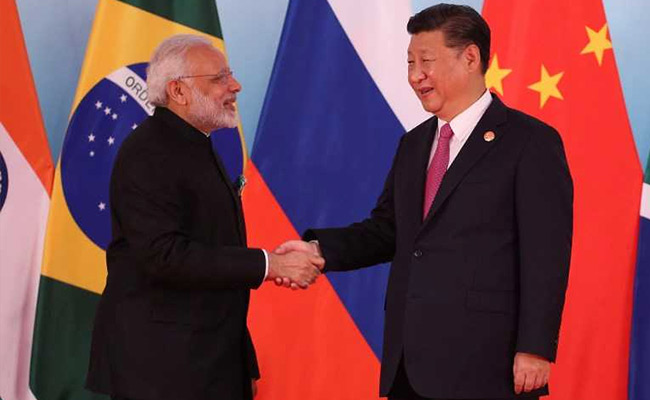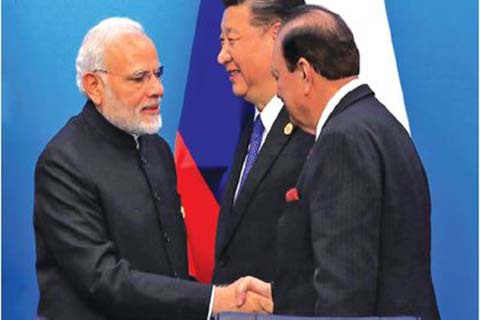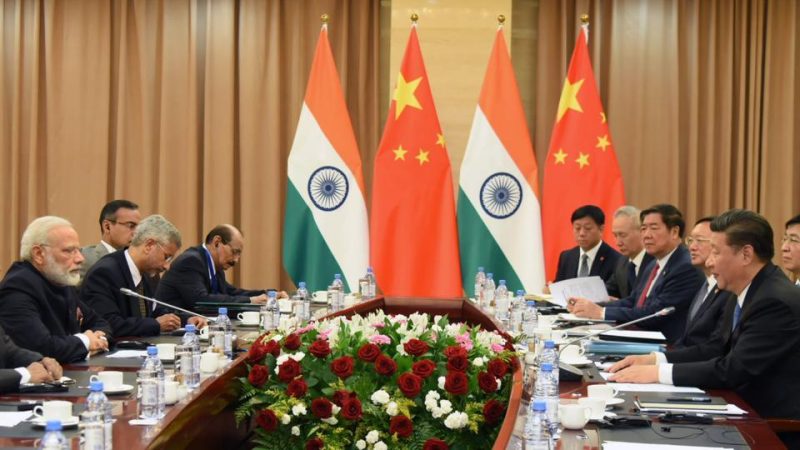
After boarding Air Force One heading for Singapore, US President Donald Trump launched a Twitter broadside to rudely reject the text of the G7 communique, which he just attended, and pile insults on his Canadian host, Prime Minister Justin Trudeau. The G7 is unraveling.
Comparisons are being drawn with the Shanghai Cooperation Organization, which took place simultaneously in Qingdao, China. The SCO summit has emphasized the gap in global leadership today.
The Financial Times, which is not exactly a friend of the SCO noted, “Russia and China form the backbone of the SCO… and despite historical animosity between Moscow and Beijing, they now appear to want to jointly resolve security issues in Eurasia without the US.”
India has some major differences in its relations with China and Pakistan and yet, the summit took place in a harmonious atmosphere. The pressure was such that even a handshake between Indian Prime Minister and the Pakistani President Mamnoon Hussain at Qingdao, which ought to be an act of civility, made headlines.
It is no secret that India has differences with China regarding the Belt & Road Initiative and there was no way India could identify with a formulation in the Qingdao Declaration affirming the SCO’s continuing support for the BRI. But India didn’t raise dust. It knew beforehand the SCO’s stance on BRI, and where there is will, there is always a way.

Modi signed the Qingdao Declaration and the Chinese hosts graciously kept the formulation as a matter concerning those SCO members who affirm support for the BRI (which is everyone else but India.) Thus, no one ‘lost’.
Clearly, Delhi is no longer strident about its opposition to the BRI. Nor is China insistent that without India getting on board the BRI bandwagon, economic cooperation between the two countries is impossible. The two countries are actually sidestepping the BRI and moving on with concrete projects to boost trade and investment.
Again, the doomsday predictions that the SCO will inevitably get bogged down in India-Pakistan disputes and discords have proved completely wrong. The two countries have shown maturity to move into the SCO tent for co-habitation without stepping on each other’s toes. It is tempting to think of a “new normal.”
The SCO gatherings are becoming an occasion for India and Pakistan to greet each other. The two foreign and defence ministers, national security advisors and even military officials came across each other in the run-up to the Qingdao summit, and sparks didn’t fly.
Now comes a strange occasion when the army contingents of the two countries will become for the first time in their 7-decades old history participants in a joint SCO military exercise.
The forthcoming anti-terror drill in Chelyabinsk in the Urals in August becomes a poignant moment. Customarily, the top brass of the participating SCO member countries gather to witness the bi-annual military drill. Will General Valery Gerasimov, head of the Russian general staff, preside over a select gathering that includes his Indian and Pakistani counterparts?
Over time, such occasions may no longer arouse excitement and may become “routine”. When that happens, and when the Indian and Pakistani counterparts begin to enter into meaningful conversations, the SCO will have touched a high water mark as a regional security organization.
The Chinese President Xi Jinping who hosted the summit at Qingdao seemed to herald such a moment when he stressed the need for all SCO member countries to “bolster strength, unity and mutual trust” and respect each other’s independent path of development and key interests.

These are early days and Indian diplomacy is getting accustomed to the SCO’s work culture. Arguably, India finds itself roughly at a point similar to China’s two decades ago when it began using the SCO forum to create synergy to steadily expand and deepen its bilateral relations with the newly independent countries of Central Asia, overcoming the backlog of Soviet-era antipathy.
To be sure, from the Indian perspective, the focal point of the weekend’s event in Qingdao was the bilateral meeting between Modi and Xi Jinping. It was a distinctly forward-looking meeting, which displayed a growing desire to deepen strategic communication and expand the bilateral economic cooperation.
In the final analysis, what stands out is that all of the above is unfolding against the backdrop of a discernible shift in the Indian foreign policies. If a finger is to be put on the defining moment, it has to be on the Informal Meeting between Modi and Russian President Vladimir Putin in Sochi on May 21. The Sochi meeting appears to have significantly influenced and clarified Modi’s own thinking on the emergent Asian order.
In fact, exactly ten days later, Modi unveiled a refreshingly new foreign policy narrative in his keynote address at the Shangri Dialogue in Singapore on June 1, which signaled a marked aversion towards the US’ containment strategies in the Indo-Pacific region. The new narrative placed accent on India’s strategic autonomy, multilateralism and regionalism. Succinctly put, it brings India on the same side of history as Russia.
Given the massive shift in the distribution of power taking place today in the direction of a multipolar world order, India can be expected to take a renewed interest in the BRICS and RIC forums as well. However, it is the SCO, which provides a unique platform for India to restructure its problematic relations with both China and Pakistan.
The power dynamic in South Asia is poised to change significantly in the downstream of the SCO membership of India and Pakistan. Given China’s close relations with Pakistan, and taking into consideration the nascent forward-looking trends in the Sino-Indian relations lately, as well as Russia’s benign presence and leadership, SCO holds the potential to become the vanishing point where the parallel perspective projections of Indian diplomacy may converge in a three-dimensional space.
MELKULANGARA BHADRAKUMAR | SCF
This article was first published by Strategic Culture Foundation
The 21st Century
